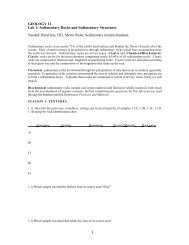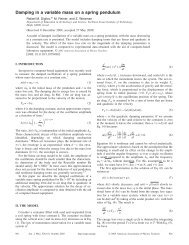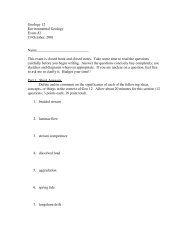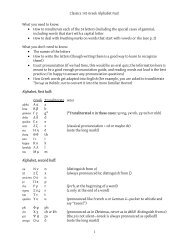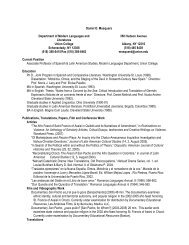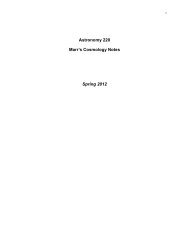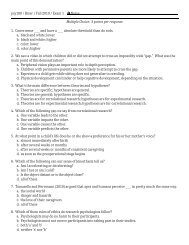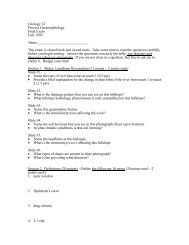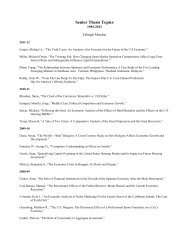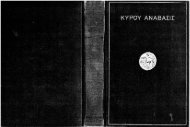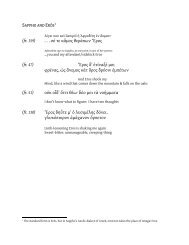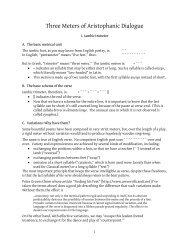Tarik Wareh Teaching Statement (Summer 2011) 1 ... - Union College
Tarik Wareh Teaching Statement (Summer 2011) 1 ... - Union College
Tarik Wareh Teaching Statement (Summer 2011) 1 ... - Union College
You also want an ePaper? Increase the reach of your titles
YUMPU automatically turns print PDFs into web optimized ePapers that Google loves.
<strong>Tarik</strong> <strong>Wareh</strong><br />
<strong>Teaching</strong> <strong>Statement</strong> (<strong>Summer</strong> <strong>2011</strong>)<br />
arts education that lies before them. FYP is a difficult challenge, but I will be coming back to it, again by<br />
choice, in Winter 2012, with significant changes (in readings and the overall structure of the course and<br />
its assignments), but aiming to enhance the success of its fundamental ideas.<br />
My Spring <strong>2011</strong> Sophomore Research Seminar (“The Ancient Historians”) was a more difficult<br />
assignment (resulting from last-minute changes in topic, format, and instructor), but I quickly<br />
developed a highly organized framework for student research into ancient historiography, with<br />
collaborative online bibliographies and interpretive brainstorming (using a course wiki, something I<br />
first tried the previous term for FYP), one-on-one feedback and consultations on the final project, and<br />
in-class workshopping of draft ideas on each week’s readings. In the final papers, I was able to see<br />
students who had chosen not only their own path of argument through the primary and secondary<br />
sources concerning the ancient historians, but who had also turned their hard work on the ancient<br />
historians into new perspectives on more recent issues, including twentieth-century international<br />
relations; the political sociology of fear as a force capable of creating unity and disunity; art criticism as a<br />
source of insight into historians’ use of emotional expressionism; partisan political propaganda; and the<br />
connections between contemporary U.S. practices surrounding death and ancient rulers’ pursuit of a<br />
“legacy.” I mention these as successes because I believe the enduring value of humanities studies includes<br />
their ability to change the student as an interpreter and analyzer of their world.<br />
Embracing challenge and involving students in my research questions: Aristotle<br />
Given my commitment to taking seriously students’ capacities for insight and understanding, I<br />
am interested in opening up new areas of challenge in the <strong>Union</strong> curriculum. Here my new course on<br />
Aristotle, taught twice so far in very different versions (Spring 2008 and Fall 2010), is a good example.<br />
The course drew a range of curious students with very different academic interests—from mathematics<br />
and science to literature and philosophy—who were plunged into the complexities of Aristotelian<br />
theory. Nothing would have been easier than avoiding the challenge and confusion of dealing with areas<br />
such as metaphysics and the philosophy of mind, but to do so would make the curriculum poorer and<br />
miss an opportunity to make visible the less obvious interconnections between classical antiquity and<br />
everything else students study at <strong>Union</strong>. For example, this course has been one avenue for encouraging<br />
interdisciplinary thought around the subject of biological theory, thus inspiring future courses and<br />
collaborations (see below). The difficult (but important) question that persists for me as I develop the<br />
third iteration of this course will be how to meet a general student audience with material of this kind.<br />
<strong>Teaching</strong> Aristotle has also allowed me to share my scholarly experience more fully than has<br />
otherwise been possible outside of language courses. This is not only because of the kind of classroom<br />
discussion that results from the difficult and technical nature of the material, over which even experts<br />
disagree. It is also because I have been able to offer students readings and ideas that are highly<br />
appropriate to their own learning path, despite not being the normal fare of undergraduate courses. For<br />
example, in the Spring 2010 version, I reoriented the course toward the discussion of ethics and<br />
incorporated weekly readings from Aristotle’s Protrepticus. This dialogue, in which Aristotle sought to<br />
inspire young people of his time (the ancient equivalent of college students) to give their respect and<br />
devotion to philosophy, is uncommonly relevant and useful in figuring out the connection between<br />
4



